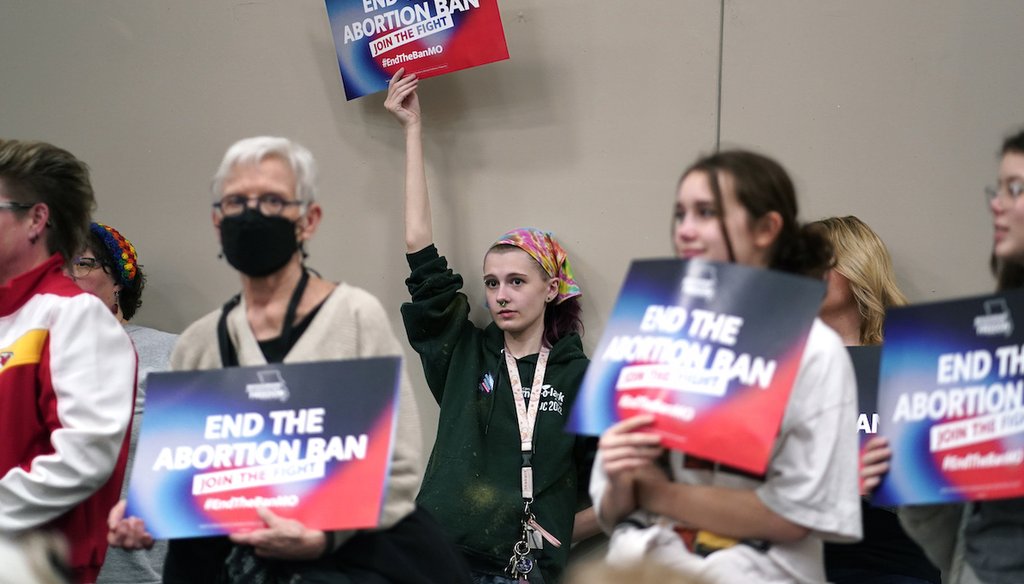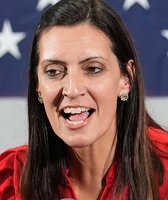Stand up for the facts!
Our only agenda is to publish the truth so you can be an informed participant in democracy.
We need your help.
I would like to contribute

A supporter holds up a sign during Missourians for Constitutionals Freedom petition drive on Feb. 6, 2024, in Kansas City, Mo. (AP)
Ban: Merriam-Webster defines it as "a legal or formal prohibition."
But in the 2024 election cycle — the first general election since Roe v. Wade, the landmark ruling that enshrined a constitutional right to an abortion, was overturned — the term has morphed into polarizing political rhetoric. "Ban" has become synonymous with abortion and the wave of anti-abortion laws enacted in states across the country.
For example, on President Joe Biden’s reelection campaign website, the abortion policy page’s title reads: "Donald Trump wants to ban abortion nationwide. Re-elect Joe Biden to stop him and protect reproductive freedom."
Trump appointed three of the U.S. Supreme Court justices who voted to overturn Roe. After years of inconsistency, Trump most recently has said that laws on abortion should be left to the states and that he wouldn’t sign a national abortion ban.
Many Democrats and abortion rights activists have also zeroed in on down-ballot Republicans, accusing them of supporting abortion "bans," even if their positions allow for some access.
"Yesterday, we celebrated Mother’s Day. Today, I remind you that politicians like Bernie Moreno, who supports a national abortion ban, don’t want moms making their own healthcare decisions. Abortion rights are on Ohio's ballot again in 2024," Ohio Democrat Allison Russo wrote May 13 on X.
Moreno, who has Trump’s support, is a Republican running for Senate in Ohio against Democratic incumbent Sen. Sherrod Brown. Moreno has said that he would vote for a 15-week national abortion ban.
Political discourse experts say "ban" has emerged as shorthand for nearly all abortion prohibitions. The blunt term, nuanced in its myriad interpretations, often leaves room for political spin.
"Ban" is not a medical term; people across the political spectrum on abortion define it differently.
The word has two main rhetorical functions, political discourse experts said. When people talk to like-minded people about a particular issue, it can reinforce the group’s beliefs. Or, it can label opponents as "extreme."
"For example, when Joe Biden talks about an assault weapon ban, he’s not trying to convert skeptics — he’s signaling to people who already agree with them that they’re on the same team," said Ryan Skinnell, an associate professor of rhetoric and writing at San Jose State University. "But the other way ‘ban’ works is to identify someone you disagree with as extreme. Groups who want to keep certain books out of libraries, for instance, rarely describe themselves as in support of book banning. Their opponents adopt that language."
This dual usage reflects in the abortion fight. Abortion-rights activists use "ban" to signal an infringement on personal freedom and autonomy over medical decisions. Anti-abortion proponents may use "ban" to signal a protection of fetal life. For example, when introducing legislation that bans abortion at various stages, Republican politicians have often framed the bills as moral imperatives that protect unborn life.
Peter Loge, a George Washington University professor who directs the school’s Project on Ethics in Political Communication, said ban has historically meant "to eliminate" or "not have," but politicians employ a strategic ambiguity that allows listeners to assign their own meaning. Loge, who served as a senior adviser in former President Barack Obama’s Food and Drug Administration, said Obama did this with one of his campaign slogans: "Change We Can Believe In."
"Well, what does ‘change’ mean? Clearly, it means whatever he thinks it means, but as a listener you will ascribe it to mean whatever you think it means," Loge said. "So, if I think most abortions should be illegal and in some cases it's OK, I can support a ban, because it's a ban with exceptions. The listener plugs in whatever caveats they prefer and ascribes them to the speaker. This is a technique as far back as Aristotle, who wrote that the listener provides the reasoning for themselves."
Loge, like Skinnell, said "ban" is often used in politics to showcase extremism and the threat of something being taken away.
"It’s the rhetoric of anger. ‘They want to take your rights from you. … Now it’s an ideological divide and it works because we’re going to be more motivated to vote," Loge said. "People are more concerned about losing something they have than they are interested in getting something new. We are risk-averse."
Nathan Stormer, a rhetoric professor at the University of Maine and an expert in abortion rhetoric, said the term usually shows up when people refer to making abortion illegal in pregnancy’s earlier stages. But, he added, although common usage typically refers to a first trimester threshold, there is "no set of rules."
"Because it is not a consistently used term, I think when people do not specify what they are referring to, others may take them to mean at conception or very early, but one has to inquire about context," Stormer wrote in an email.
Before the 1970s, there was little discussion about abortion bans.
Although legal abortion existed in various states at various stages before the Supreme Court decided Roe v. Wade in 1973, the ruling’s enshrinement of abortion rights across the country, helped galvanize opposition and mobilize anti-abortion groups.
"There were book bans, pornography bans, dancing bans, and so on. But even most conservative politicians and church groups weren’t especially concerned with abortion as an issue, and there was virtually no concerted political interest in bans," Skinnell, from San Jose University, said. "That began to change with Richard Nixon."
Skinnell said the former president’s advisers, in coordination with evangelical Christian church leaders, determined they could connect abortion to left-wing social movements, such as feminism, by linking them consistently in speeches and campaign materials.
"The idea of abortion bans came directly out of that partnership," Skinnell said, "and it gathered steam in right-wing and conservative circles throughout the next few decades."
Republicans further popularized the term in the mid-1990s, when they advocated for the Partial-Birth Abortion Ban Act, which President George W. Bush signed into law in 2003. The campaign to pass that legislation, experts said, introduced the term "ban" as the abortion restriction’s "stated intent."
Political rhetoric experts said much of the medical literature and media coverage before Roe v. Wade often used terms such as "illegal" because abortion was considered a criminal act in most states.
"Even in the early stages of criminalizing abortion in the U.S., I don't think ban was a common term," Stormer said. "When a restriction is being put in place where before there was not one, people tend to resort to the word ban."
Emily Winderman, a University of Minnesota professor specializing in the rhetorical study of health and medicine, said that over time abortion "bans" have manifested as "incremental" restrictions throughout gestational development to the complete prohibitions seen in multiple states today.
For instance, she said, "heartbeat bills," which typically refer to laws that make abortion illegal as early as six weeks of pregnancy, were controversial when they emerged around 2010, but have become more prevalent since the Trump administration and Roe’s overturning.
Winderman also said bans can appear via code and ordinance restrictions, such as banning the type of use for a particular piece of real estate — making abortion clinics impossible to place.
"It's important to understand bans as a complex strategy that includes gestational limits as well as limitations on who can provide care and where," she said.
Shifting abortion laws across the U.S. have made "ban" an increasingly common term. Forty-one states now ban abortion at different points in pregnancy — 14 enforce total bans, three enforce six-week bans and others restrict abortion before fetal viability.
Stormer, from the University of Maine, pointed to Arizona’s Supreme Court reinstating an 1864 law that completely banned abortion. (It has since been repealed.) At the time the law was written, conception was not well understood, and there was no clear sense of fertilization or how it worked.
"Reinstating that law was a great example of how the conflict over abortion has remained steady and largely recognizable, but its terms and understandings have been constantly moving, which says something," Stormer said. "So, specific words do important work, but they do not capture what is happening rhetorically, in my opinion. The moving terminologies are the waves crashing, but the tides are the thing."
RELATED: The top claims about abortion, fact-checked
RELATED: All abortion bans include exceptions for a mother’s life. But are they working?
Our Sources
JoeBiden.com, Abortion, Accessed May 13, 2024
X post, May 13, 2024
X post, May 10, 2024
Politico, Trump said it’s up to the states to decide abortion. Here’s everything else he didn’t say, April 9, 2024
WBUR, The Rhetoric That Shaped The Abortion Debate, June 28, 2010
Quarterly Journal of Speech, Rhetorical strategies for retrieving abortion rights, September 2022
Merriam-Webster, Ban definition and meaning, Accessed May 1, 2024
Justia.com, Roe v. Wade, 410 U.S. 113 (1973)
Hopkins Bloomberg Public Health, A Brief History of Abortion in the U.S., 2022
Guttmacher Institute, State Bans on Abortion Throughout Pregnancy, Updated May 1, 2024
Email interview, Emily Winderman, a professor at the University of Minnesota who specializes in the rhetorical study of health and medicine, April 15, 2024
Email interview, Nathan Stormer, rhetoric professor and expert in abortion rhetoric at the University of Maine, May 6, 2024
Email interview, Ryan Skinnell, associate professor of rhetoric and writing at San José State University, May 10, 2024
Phone interview, Peter Loge,a professor at George Washington University and director of the school’s Project on Ethics in Political Communication, May 10, 2024
Email interview, Lisa Corrigan, professor of communication at the University of Arkansas, May 13, 2023



































